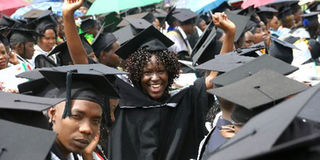Diploma 'disease’ is stunting development

A graduand celebrates during the 32nd graduation at Egerton University in Njoro, Nakuru on June 19, 2015. More than 1,300 students graduated with degrees and diplomas in various fields at the ceremony. PHOTO | SULEIMAN MBATIAH | NATION MEDIA GROUP
What you need to know:
- Western style education is largely accepted and emulated based on the assumption of its superiority, capacity to place individuals in high positions and to catalyse socio-economic and political growth and development. It continues to grow as its ideologies are disseminated through books, journals and the media.
- In policy practice research facilities offer an understanding of the situations, particularly the extent to which education is meeting predetermined natural goals, which are more or less static.
Nothing demonstrates the depth and breadth of colonialism in modern Africa than formal academic education and the privileges that accrue to the few who pursue it to the highest level.
Western style education is largely accepted and emulated based on the assumption of its superiority, capacity to place individuals in high positions and to catalyse socio-economic and political growth and development. It continues to grow as its ideologies are disseminated through books, journals and the media.
In policy practice research facilities offer an understanding of the situations, particularly the extent to which education is meeting predetermined natural goals, which are more or less static.
The emerging knowledge helps to determine a variety of actions based on what they consider important and realistic and this may include research questions such as what is higher education for? What is working or not working in the education system?
These questions may not be mutually exclusive at the breadth and depth of many studies undertaken by scholars or consultants. Arguably, the Western model of education has been viewed as something powerful and prestigious. But when superimposed upon the peculiar African context, these models of education have continuously manifested some weaknesses such as why bright young students aspire to be become lawyers, doctors and engineers when, in fact, the opportunities for wealth creation are in the informal sector of agri-business and urban agriculture, among others. There is a compelling dual explanation of this. Western education is associated with white-collar jobs and students are trained to fit in these jobs.
Adequate attention is not paid to acquiring skills for survival at the lower levels or entrepreneurship. The result has been the mismatch between what is taught at school and the needs of the labour market and acute youth unemployment that is a ticking time bomb.
The elitist education system has not captured the needs of all groups in society. As such, some groups have been rewarded, while others such as women and the vulnerable, remain at the periphery.
This is further reflected in the gap between the rich and the poor, which continues to widen as illegitimate means of accumulating wealth are heightened, including criminal activity. Although a few uneducated Africans are among the wealthiest and most powerful people in business, sports, and politics, this is a small proportion that cannot tilt the status quo. Further, middle-level colleges have been converted into universities, signalling that less value is attached to any education below the status of a university.
The diploma disease is real in Africa, as individuals continue to seek to augment their certificates because credentials for the same type of job are constantly increasing.
Education has entrenched asymmetric relations in society with the educated looking down upon those less educated. This is a reflection of how Western education has trivialised culture and broken down traditional value system of equality, fraternity, sisterhood, liberty, mutual dependency and neighbourliness, solidarity and celebration of diversity. It is, therefore, not surprising that there is so much strife in society and corruption is a pressing problem.
This points out that the advancement of knowledge is skewed, often delinked from African realities and some of the theories fall short of explaining the experiences of Africans. The link to reality is essential for extending the social meaning of theories in African context.
For example, what is “university” in an African perspective? How can “democracy” or “technology” or “governance” be conceptualised in an African perspective?
A key trajectory for a meaningful Africanisation of knowledge production is for African scholars to develop and nurture truly African forms and systems and application of the locally created knowledge towards understanding and tackling local challenges facing the communities on the continent.
Beatrice Muganda is an educationist.




